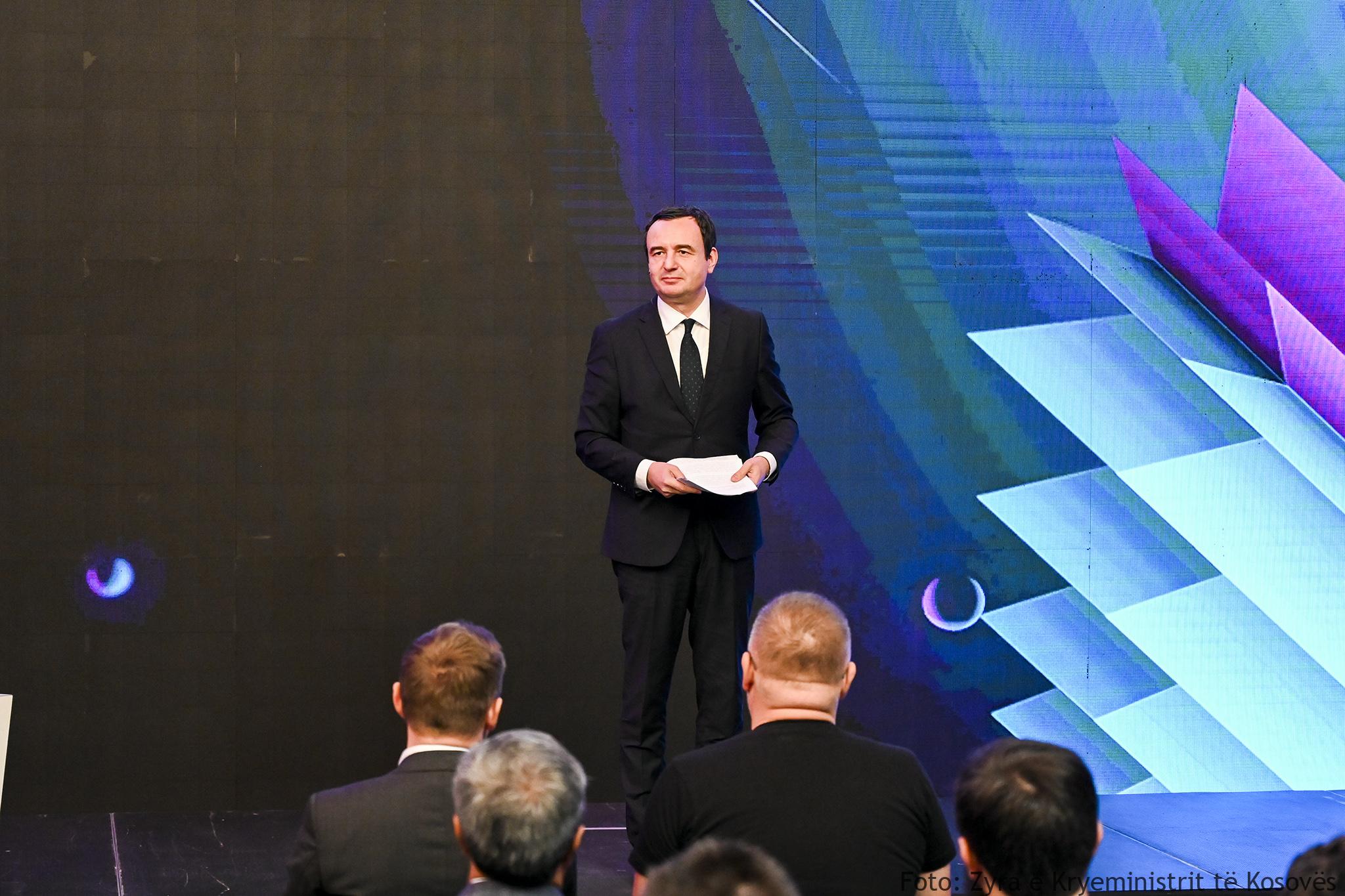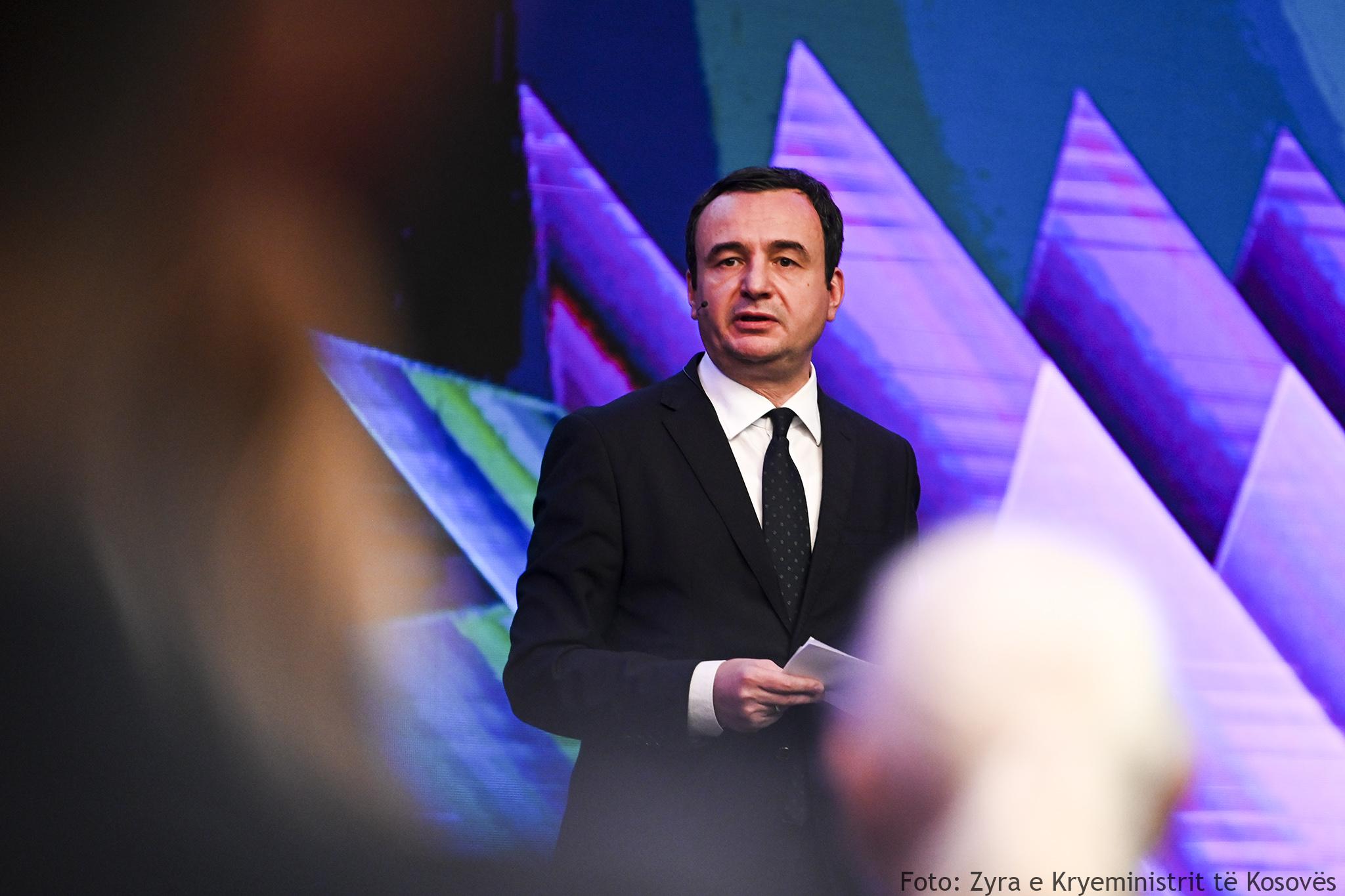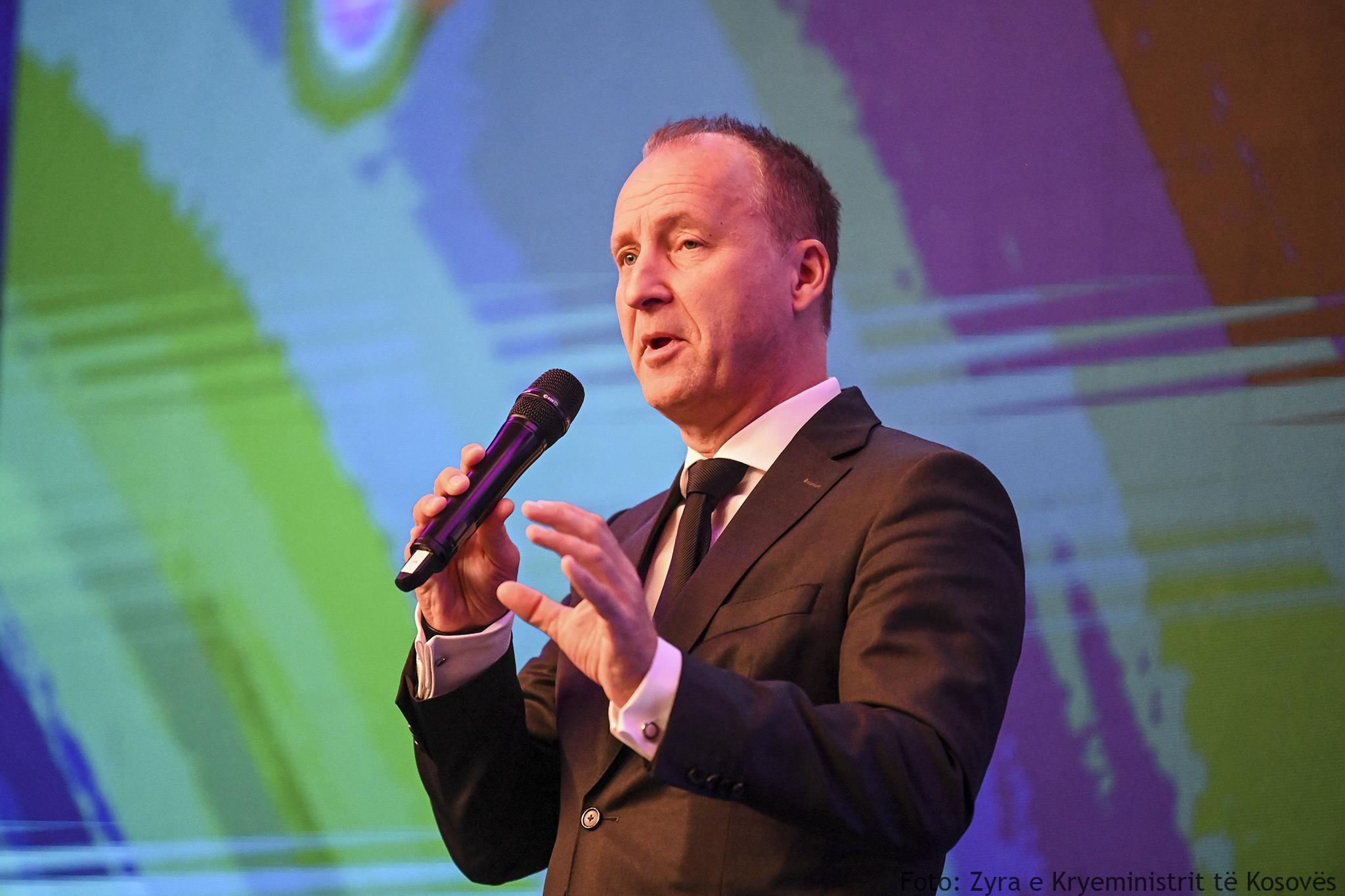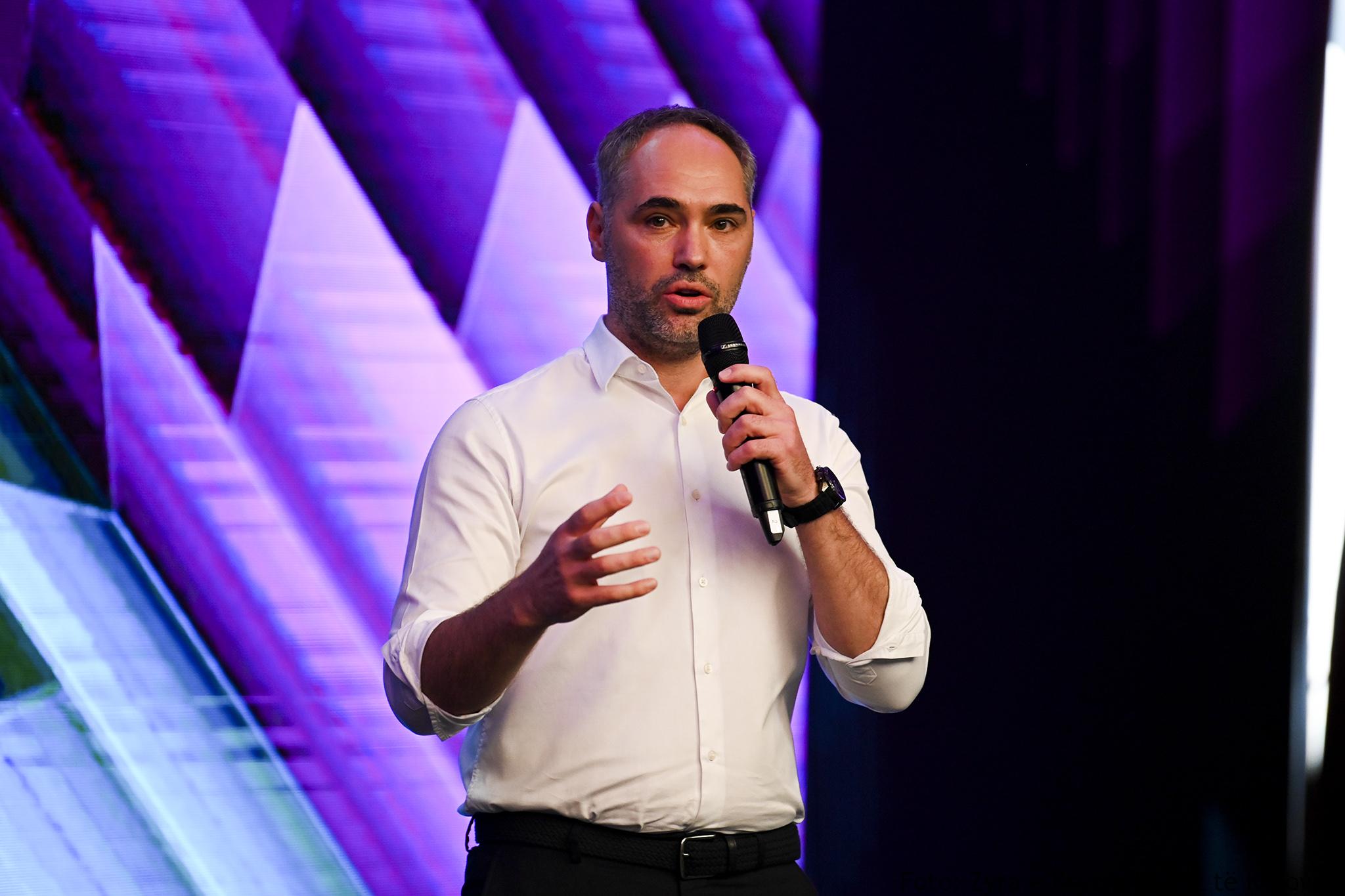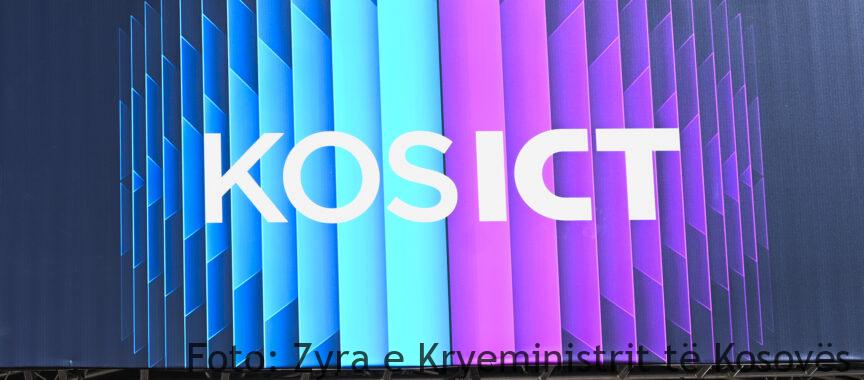Prishtina, 07 October 2022
At the largest conference in the region in the field of Information and Communication Technology (ICT), the Prime Minister of the Republic of Kosovo, Albin Kurti, appreciated the role of KOSICT in building and strengthening relations and cooperation between the public sector, the private sector and academia of Kosovo, the region and beyond.
In the National Development Strategy, digital transformation pervades all sectors, touching digitization and industry, the private and public sector, but also healthcare, education and especially public administration, stated Prime Minister Kurti.
The Prime Minister emphasized that with many highly competent ICT companies and a vibrant community of ICT professionals, ICT is one of the few sectors in which our country has a positive trade balance, hence, according to him, it is no surprise that the ongoing assessment process of the Smart Specialization Strategy has already identified ICT as one of the five priority sectors in our economy with the highest potential for growth and innovation, elaborated Prime Minister Kurti.
Kurti further spoke about the commitment of the Government, in cooperation with the German government, for the Innovation and Training Park in Prizren as one of the key platforms within the national innovation ecosystem. He also singled out the support for the completion of the Digital Technology Park in Bërnica, which will provide the infrastructure for the development and growth of the ICT industry.
Implementing digital transformation, guaranteeing cyber security, developing skilled professionals and building the innovation ecosystem – each of these objectives requires a joint and coordinated commitment of the public and private sectors, said Prime Minister Kurti.
Finally, Kurti emphasized that the Government of the Republic of Kosovo is open, ready and interested in cooperating with the private sector and academia in achieving common objectives aimed at the development of our country.
Full speech of Prime Minister Kurti:
Honorable organizers of KOSICT,
Honorable Ms. Çavolli and Mr. Canhasi,
Honorable Ambassadors,
Honorable guests and members of the ICT community,
It is an immense pleasure to be here on the occasion of the 11th edition of KOSICT – the largest technology festival in the region. This is my second time participating in KOSICT – a festival that brings together the local ICT community, local, regional and international experts and industry leaders, and provides a forum for sharing knowledge, experience and ideas on digital transformation, digital economy and technological innovations. And most importantly, it is a festival that helps build and strengthen relationships and cooperation between the public sector, the private sector and academia of Kosovo, the region and beyond.
We have now worked on the National Development Strategy and the digital transformation extends everywhere, meeting digitization and industry, the private and public sector, but also healthcare, education and especially public administration.
We want to make our services of better quality and our public officials more transparent, while increasing accountability in all sectors of governance, both public and private.
Every area of government and every sector of the economy is important, and so is digitization in each of those areas and sectors. But, in particular, we are incredibly pleased to announce that last week, our Government approved the “Education Strategy 2022-2026” which provides a comprehensive roadmap for reforming the education system at all levels.
I want to emphasize that the planned budget of the reform presented by the education strategy is about EUR 333 million, i.e. 82% higher than the previous budget of the “Education Strategic Plan 2017-2021”, which had a budget of about EUR 174 million. So, the budget for the Strategy will be EUR 333 million.
In addition, for the first time, digitization is treated as one of the five pillars and strategic objectives of the education strategy, with a dedicated budget of around EUR 52 million.
Digitization of public administration is particularly important for improving the quality of services to citizens and our businesses, as well as for increasing the transparency and accountability of our administration, on which our governance depends, and the success of our businesses.
Last month, our government approved a new program aimed at administrative burden prevention and reduction. This program, together with the Public Administration Reform Strategy, which has already been finalized, and the Electronic Government Strategy, which is under preparation, will provide a strategic framework for digitization at the government.
An immediate priority is the digitization of some of the key and most used services for citizens and businesses.
Following the launch of electronic payments for government services, digitized civil status certificates and the digitization of some steps for vehicle registration renewal, we will soon issue digitized property certificates as well.
Electronic identification is one of the main building blocks of e-government and we have already adopted the necessary legislation for its implementation. The EU procurement process for the project, which will implement e-ID nationally, is already underway. By enabling safe and reliable identification of citizens and businesses, as well as implementing electronic signatures, the e-ID project will pave the way for the end-to-end digitization of many services in the public and private sectors.
Moving forward with digitization in all areas of governance also requires a greater focus on strengthening cyber security.
Last month, the government approved the Law on Cyber Security, which lays down the legal basis for the establishment of the Agency for Cyber Security.
Meanwhile, we are also amending the Criminal Code to include therein all relevant criminal offenses related to cybercrime.
Most recently, we have established a multi-stakeholder working group on critical infrastructure cybersecurity.
Last month we also launched the Frequency Spectrum Monitoring System, which has an impact on the security of electronic communications.
Honorable participants,
With many highly competent ICT companies and a vibrant community of ICT professionals, ICT is one of the few sectors in which our country has a positive trade balance. Hence, it is no surprise that the ongoing assessment process of the Smart Specialization Strategy has already identified ICT as one of the five priority sectors in our economy that have the highest potential for growth and innovation.
However, the demand for qualified ICT professionals is much higher than the available supply and the growth of the ICT sector also requires an innovative ecosystem that will provide the necessary infrastructure and links between research, innovation and entrepreneurship.
Our government, in cooperation with the German government, is continuing to invest in the Innovation and Training Park in Prizren, as one of the key platforms within the national innovation ecosystem. We have also continued our support for the completion of the Digital Technology Park in Bërnica, which will provide the infrastructure for the development and growth of the ICT industry.
In December last year we became a member of Horizon Europe and last month we approved the beginning of the process to join another important EU program – Digital Europe. Membership in Digital Europe will provide additional opportunities for our government institutions and local companies to apply for ICT projects funded by this program.
Implementing digital transformation, ensuring cyber security, developing skilled professionals and building the innovation ecosystem – each of these objectives requires a joint and coordinated commitment of the public and private sectors. We are open, ready and interested to cooperate with the private sector and academia in achieving common objectives aimed at the development of our country.
Maybe we can say that the 20th century marks the failure of Esperanto, but I believe that in the 21st century, coding and English are the successful Esperanto. Therefore, we are looking forward to reforming our education and together making the digital transformation that not only creates opportunities for successful businesses, but also creates opportunities for opportunities for successful business doing.
Thank you very much and I wish you success!
Last modified: October 10, 2022




